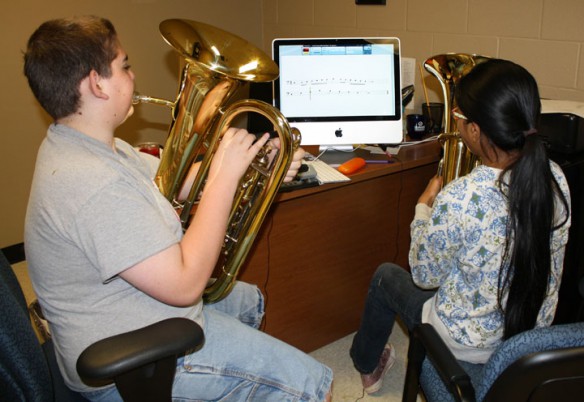
Students at South Warren Middle School (Warren County) use the SmartMusic program during class in the spring of 2011.
Photo by Don Sergent/Warren County Public Schools
By Matthew Tungate
matthew.tungate@education.ky.gov
Formal training in how to play a musical instrument usually involves playing scales – and as long as students have been learning to play instruments, students have hated playing scales.
Magan Collar, assistant band director at Drakes Creek Middle and Greenwood High schools (Warren County) had just such a student last year. He simply didn’t like to practice his chromatic scale, and he came to band class every day and got it wrong, she said.
So Collar put him in the practice room adjacent to the band room and told him to practice.
“When I came back, he had practiced it over a hundred times,” she said.
That’s because the student was not practicing alone. He was using a software program called SmartMusic in which he could see the music on a computer screen, play along with it, slow it down, record himself and see a percentage of correct notes he got each time he practiced.
Because SmartMusic logs how many times a student uses it, Collar could see how many times he had tried.
“It’s nice to get that feedback, and they can see what they’re doing wrong,” she said. “It’s guided practice.”
Chris Cecil, band director at South Warren High, worked with his fellow band directors to get a grant from the district to put SmartMusic in all four high schools and all four middle schools last year. In addition to the computer program, schools received new computers, microphones and licenses for the music. It cost about $36,000 for the eight schools, he said.
Cecil said he had seen SmartMusic demonstrated at the Kentucky Music Educators Association annual convention and observed it used by the band program at Oldham County High School.
Sheila Smalling, band director at Drakes Creek Middle, said students of today are energized by being able to do something on the computer.
“It’s like playing a video game, but your skill is playing, not working a joystick,” she said. “They feel like they’re playing a game, but they’re actually practicing their instruments.”
Collar said she first used SmartMusic as a trumpet student at the University of Kentucky and really likes it.
“I think it’s underutilized in public schools,” she said. “I think people don’t realize how much of an improvement you can see in your program from using it.”
Collar said being able to slow down a piece of music to allow students to play it correctly is a big benefit of the program.
“That’s not something you can do in a band class,” she said.
Cecil said SmartMusic allows each teacher to create and send assignments to each student. The students can practice their instruments with a computer at school or at home and receive feedback from the computer as to their “performance” (a recording is played back and given with a numerical score). Teachers can track progress for each student in a grade book.
“This allows the student and teacher to use and focus on individual progress while not interrupting normal band rehearsals to listen to playing tests, and it alleviates the difficulty of scheduling students to stay after school around everyone’s busy schedules,” he said.
At Cecil’s school, students are given an assignment with a due date. When the student is satisfied with his or her performance on the assignment, SmartMusic electronically sends the teacher a grade and a recording of that assignment.
“It is effective because it allows guided practice to those students who do not take private lessons,” he said. “Most importantly, today’s students have embraced technology so much, that SmartMusic has revitalized interest in playing their instruments at home.”
Smalling said she finds SmartMusic to be very accurate – and objective.
“It doesn’t love you. It tells you what it hears,” she said.
But because they receive a score, Smalling said students will use the SmartMusic program on a Friday and come in on Monday saying they practiced at home all weekend and want another opportunity to raise their scores.
“And that’s what we want,” she said. “We don’t want to test them and say, ‘Oh, you bombed. Sorry about your luck.’ We want them to try to improve.”
Music is creative and teachers want them to love music, Smalling said.
“Discouraging a kid is not the way to make it happen,” she said.
Success is a great encouragement. Cecil said one of his colleagues hired a college student to input the All-District and All-State Band audition music into SmartMusic. He shared the music files with the other band directors so their students were able to check out a SmartMusic laptop and practice their audition music at home.
“This guided practice was critical to those students who could not normally stay after school to study their audition music with a teacher,” he said. “Because of that, I had several students who would not have usually made the All-District Band become successful.”
Smalling said using SmartMusic is like a student’s personal assessment.
“It’s like a private lesson, but it’s on a computer,” she said.



Leave A Comment